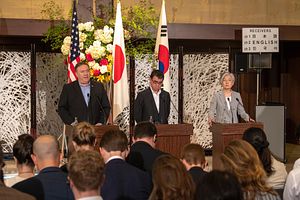On Tuesday, a senior U.S. State Department official said that the United States was looking for a reduction in tensions between South Korea and Japan. Relations between the two Northeast Asian neighbors, each a U.S. ally, have significantly deteriorated this summer, following Japan’s imposition of export controls on Seoul in early July.
Speaking to journalists in Washington D.C., the official said that the leaders of both countries — Japanese Prime Minister Shinzo Abe and South Korean President Moon Jae-in — had made “unhelpful” moves in the dispute.
“I keep thinking we have reached rock bottom and then keep getting surprised,” the official, speaking anonymously, said. “I’m hopeful both sides have made their point. We are still actively engaged in trying to get them now to start rebuilding this relationship.”
Addressing the South Korean decision to terminate the General Security of Military Information Act (GSOMIA), the official said that Seoul’s move “pretty much damaged the possibility of continuing in this information-sharing agreement,” but added: “It is not completely lost… There are opportunities to hopefully recover.”
Also speaking on Tuesday, South Korean Prime Minister Lee Nak-yeon said that the GSOMIA could be reincorporated if Japan were to reverse the economic measures it had taken against South Korea earlier this summer.
“If the inappropriate measures taken by Japan are reverted back to their original status, I believe it would be desirable for our government to also reconsider the GSOMIA with Japan,” Lee, speaking at the South Korean National Assembly, said.
The senior U.S. official suggested that the South Korea-Japan GSOMIA had direct consequences for U.S. security interests in Asia. “The problem is, and the reason why we’re talking about it today, is because the most recent action on the part of Seoul directly affects U.S. security interests. This is something we can’t sit quiet for,” the official said.
The United States supported the conclusion of a South Korea-Japan GSOMIA to facilitate trilateral cooperation against North Korea.
The comments came days after the South Korean government announced that it would not renew a 2016 agreement on sharing classified military information with Japan. The 2016 agreement was concluded between Seoul and Tokyo after considerable U.S. encouragement.
Two senior officials, Assistant Secretary of State for East Asia and the Pacific David Stilwell and National Security Council Senior Director for Asia Matt Pottinger, have been involved in navigating the ongoing dispute between Seoul and Tokyo.
South Korea and Japan have a range of outstanding disputes. The ongoing crisis emerged largely as a result of a November 2018 decision by South Korea’s Supreme Court request that Japanese firm Mitsubishi must compensate South Korean victims of forced labor during Japan’s colonial occupation of the Korean Peninsula.

































